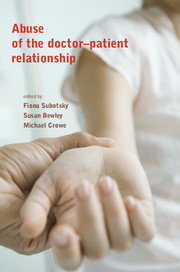Book contents
- Frontmatter
- Contents
- List of figures, tables and boxes
- List of contributors
- Foreword
- Introduction: mapping the territory
- 1 The ethical importance of boundaries to intimacy
- 2 The patient's perspective: impact and treatment
- 3 Teaching ethics and ethical behaviour to medical students
- 4 With the benefit of hindsight: lessons from history
- 5 The prevalence of boundary violations between mental health professionals and their clients
- 6 Psychiatry: responding to the Kerr/Haslam Inquiry
- 7 The general practitioner and abuse in primary care
- 8 Boundaries and boundary violations in psychotherapy
- 9 Sexual therapies: ethical guidelines, vulnerabilities and boundaries
- 10 Obstetrics and gynaecology: a special case?
- 11 Nurses as abusers: a career perspective
- 12 Medical management: governance and sexual boundary issues
- 13 Dealing with offending doctors: sanctions and remediation
- 14 Defending doctors: the protection society's experience
- 15 Regulation and its capacity to minimise abuse by professionals
- 16 The role of the General Medical Council
- Appendix 1 Extract from Vulnerable Patients, Safe Doctors
- Appendix 2 Codes of ethics of psychiatric associations in other countries
- Appendix 3 Guidance from the Council for Healthcare Regulatory Excellence
- Appendix 4 Examples of determinations by the General Medical Council's Fitness to Practise panels
- Appendix 5 Website resources and information
- Index
- Plate section
Appendix 3 - Guidance from the Council for Healthcare Regulatory Excellence
Published online by Cambridge University Press: 02 January 2018
- Frontmatter
- Contents
- List of figures, tables and boxes
- List of contributors
- Foreword
- Introduction: mapping the territory
- 1 The ethical importance of boundaries to intimacy
- 2 The patient's perspective: impact and treatment
- 3 Teaching ethics and ethical behaviour to medical students
- 4 With the benefit of hindsight: lessons from history
- 5 The prevalence of boundary violations between mental health professionals and their clients
- 6 Psychiatry: responding to the Kerr/Haslam Inquiry
- 7 The general practitioner and abuse in primary care
- 8 Boundaries and boundary violations in psychotherapy
- 9 Sexual therapies: ethical guidelines, vulnerabilities and boundaries
- 10 Obstetrics and gynaecology: a special case?
- 11 Nurses as abusers: a career perspective
- 12 Medical management: governance and sexual boundary issues
- 13 Dealing with offending doctors: sanctions and remediation
- 14 Defending doctors: the protection society's experience
- 15 Regulation and its capacity to minimise abuse by professionals
- 16 The role of the General Medical Council
- Appendix 1 Extract from Vulnerable Patients, Safe Doctors
- Appendix 2 Codes of ethics of psychiatric associations in other countries
- Appendix 3 Guidance from the Council for Healthcare Regulatory Excellence
- Appendix 4 Examples of determinations by the General Medical Council's Fitness to Practise panels
- Appendix 5 Website resources and information
- Index
- Plate section
Summary
Extract from Clear Sexual Boundaries Between Healthcare Professionals and Patients: Responsibilities of Healthcare Professionals (CHRE, 2008; http://www.chre.org. uk/_img/pics/library/0801_Clear_Sexual_boundaries_professionals.pdf).
Examples of sexualised behaviour by healthcare professionals towards patients or their carers:
• asking for or accepting a date
• sexual humour during consultations or examinations
• inappropriate sexual or demeaning comments, or asking clinically irrelevant questions, for example about their body or underwear, sexual performance or sexual orientation
• requesting details of sexual orientation, history or preferences that are not necessary or relevant
• internal examination without gloves
• asking for, or accepting an offer of, sex
• watching a patient undress (unless a justified part of an examination)
• unnecessary exposure of the patient's body
• accessing a patient's or family member's records to find out personal information not clinically required for their treatment
• unplanned home visits with sexual intent
• taking or keeping photographs of the patient or their family that are not clinically necessary
• telling patients about their own sexual problems, preferences or fantasies, or disclosing other intimate personal details
• clinically unjustified physical examinations
• intimate examinations carried out without the patient's explicit consent
• continuing with examination or treatment when consent has been refused or withdrawn
• any sexual act induced by the healthcare professional for their own sexual gratification
• the exchange of drugs or services for sexual favours
• exposure of parts of the healthcare professional's body to the patient
• sexual assault.
- Type
- Chapter
- Information
- Abuse of the Doctor-Patient Relationship , pp. 208Publisher: Royal College of PsychiatristsPrint publication year: 2010



